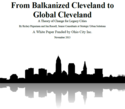Looking at a map of the metropolitan areas of the United States, it would be easy to get the impression that “urban sprawl” had consumed most of the nation. Indeed, as Figure 1 indicates, one could drive from Santa Rosa, north of San Francisco to the Arizona-New Mexico border without ever leaving a metropolitan area. This more than 1,000 mile trip (1,600 kilometers) would take nearly 15 hours, according to Google Maps. New Jersey is shown as all-metropolitan, as well as Delaware. But looks can be deceiving. read more »
Demographics
The Geography Of Aging: Why Millennials Are Headed To The Suburbs
One supposed trend, much celebrated in the media, is that younger people are moving back to the city, and plan to stay there for the rest of their lives. Retirees are reportedly following suit.
Urban theorists such as Peter Katz have maintained that millennials (the generation born after 1983) show little interest in “returning to the cul-de-sacs of their teenage years.” Manhattanite Leigh Gallagher, author of the dismally predictable book The Death of Suburbs, asserts with certitude that “millennials hate the suburbs” and prefer more eco-friendly, singleton-dominated urban environments. read more »
China Failing its Families
China's recent decision to reverse – at least in part – its policy limiting most couples to one child marks a watershed in thinking about demographics. Yet, this reversal of the 30-year policy may prove unavailing due to reasons – notably dense urbanization and high property prices – that work against people having more children.
China already faces a demographic crisis unprecedented for a still-poor country. By 2050, China will have 60 million fewer people under 15 years of age, while the over-65 population grows by 190 million, approximately the population of Pakistan, the world's sixth-most populous country. The U.S. Census Bureau estimates that China's population will peak in 2026, and then will age faster than any country besides Japan; most of the world's decline in children and workers ages 15-19 over the next two decades will take place in China. read more »
The Revolt Against Urban Gentry
The imminent departure of New York’s Mayor Michael Bloomberg, and his replacement by leftist Bill DeBlasio, represents an urban uprising against the Bloombergian “luxury city” and the growing income inequality it represents. Bloomberg epitomized an approach that sought to cater to the rich—most prominently Wall Street—as a means to both finance development growth and collect enough shekels to pay for services needed by the poor. read more »
Moving to the Heart of Europe
Europe's demographic dilemma is well known. Like East Asia and to a lesser degree most of the Western Hemisphere, Europe's birth rates have fallen so far that the population is becoming unable to replenish itself. At the same time, longer life spans have undermined the poulation’s ability to withstand a growing old age dependency ratio, challenging the financial ability (and perhaps even willingness) of a smaller relative workforce in the decades to come. read more »
From Balkanized Cleveland to Global Cleveland: A Theory of Change for Legacy Cities
Legacy cities have legacy costs, including disinvestment from the inner city, as well as regional economic decline. The spiral has been ongoing for decades. The new white paper by consultants Richey Piiparinen and Jim Russell entitled “From Balkanized Cleveland to Global Cleveland”, funded by the Cleveland-based neighborhood non-profit Ohio City Inc., examines the systemic reasons behind legacy city decline, all the while charting a path to possible solutions. read more »
Progressive Policies Burden the Yeoman Class
Obamacare's first set of victims was predictable: the self-employed and owners of small businesses. Since the bungled launch of the health insurance enrollment system, hundreds of thousands of self-insured people have either had their policies revoked or may find themselves in that situation in the coming months. read more »
Jerry Brown and California’s “Attractive” Poverty
Jerry Brown is supposed to be a different kind of politician: well informed, smart, slick, and skilled. While he has had some missteps, he's always bounced back. His savvy smarts have allowed him to have a fantastically successful career while generally avoiding the egregious dishonesty that characterizes so many political practitioners. read more »
Are Millennials Turning Their Backs on the American Dream?
In his classic 1893 essay, “The Significance of the Frontier in American History,” historian Frederick Jackson Turner spoke of “the expansive character of American life.” Even though the frontier was closing, Turner argued, the fundamental nature of Americans was still defined by their incessant probing for “a new field of opportunity.” Turner’s claim held true for at least a century—during that time, the American spirit generated relentless technological improvement, the gradual creation of a mass middle class, and the integration of ever more diverse immigrants into the national narrative. read more »
Density, Unpacked: Is Creative Class Theory a Front for Real Estate Greed?
“The heresy of heresies was common sense”—George Orwell
The stories we tell affect the lives we lead. I do not mean to be abstract here. I mean, literally, the stories that are told make up a kind of meta-reality that soaks in us to form a “truth”. This “truth” affects policy, which affects investment, which affects bricks and mortar, pocketbooks, and power. Eventually, the “truth” trickles down into a more real reality that defines the lives of the powerless. read more »



















